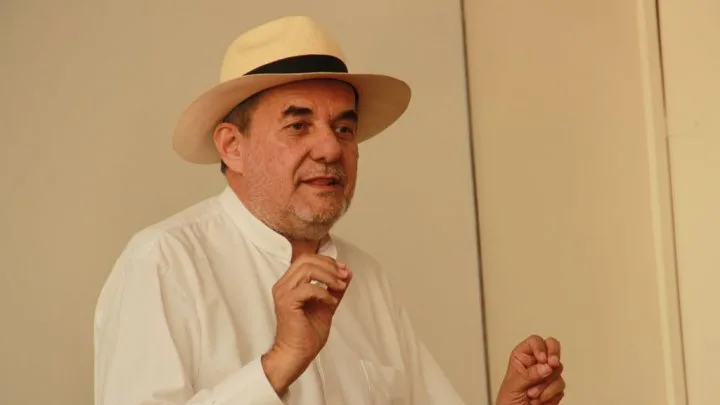Ecuador’s Secretary of ‘Good Living’ takes his message on the road
Ecuador is on a mission to confound Western governments. President Rafael Correa has sent one of his most popular cabinet members on a two-week European tour that includes stops in Florence, Paris, Madrid and Geneva. The high-level representative is not asking his European counterparts for money to save a natural reserve, nor has he brought a slick, million-dollar tourism campaign. Instead he wants to donate a valuable commodity in which the small South American country may be enjoying a market edge: Happiness.
The man’s name is Freddy Ehlers. A respected journalist and TV personality in his home country, he joined Correa’s government in 2010 as its tourism minister. But in 2013 Ehlers helped launch Ecuador’s so-called State Secretary for Good Living (Secretaría del Buen Vivir), and has been spearheading the unusual initiative ever since.
The Buen Vivir ministry claims its undertaking is rooted in ancestral Mesoamerican philosophy. Its presidential mandate is to transform Ecuadorian institutions and individuals in order to “achieve a mindful life and a maximum level of happiness”. Ehlers openly draws a parallel between Ecuador’s Buen Vivir and Bhutan’s Gross National Happiness (GNH), an index meant to serve as an alternative to GDP as a measure of a country’s progress.
“Bhutan coined the term more than 30 years ago, but Ecuador is the first country in the world to set up a government body charged with building a happier society,” Ehlers told FRANCE 24 during an interview in Paris this week.
“We have tested new projects and we have two years of experience under our belt. We would like to share that with France and other countries. We are encouraging them to set up similar institutions, on a smaller scale at first.”
In fact, France has flirted with the idea of measuring its happiness in the past. In 2008, then president Nicolas Sarkozy asked Nobel winning economist Joseph Stiglitz to devise a way of calculating happiness in the country. A few years later, the Organization for Economic Co-operation and Development had come up with an index to compare happiness among member states.
Ehlers avoids grandstanding on the subject of happiness, but it helps that a recent survey by the U.S. polling firm Gallup placed Ecuador second – tied with neighboring Colombia and with Guatemala – on a worldwide index for positive emotions. With a score of 89, Paraguayans were revealed to be the most upbeat people. The United States scored 79 points and France claimed 76, according to Gallup. Sudan bottomed the list with a “positive experience index score” of 47.
TRENDSETTER
It’s easy to imagine a French bureaucrat losing patience with Ehlers as he explains the world is hastening an apocalyptic demise when governments lump industrial output, consumer spending and well-being together. The stout and charming man tends to digress into personal anecdotes, and never misses a chance to quote the Greek philosopher Epicurus. He has ordered stickers with the motto “Nothing is enough for the man to whom enough is too little” printed in the hundreds. He doles them out like they were his business card.
He tells anyone that will listen that we must rescue the planet in order to reclaim true happiness, and vice-versa. Separating the two struggles means both will end in defeat. The problem for those tempted to send away Ehlers and his entourage with a half smile and polite handshake is that they are onto something.
University-level courses on happiness, pioneered at the University of Pennsylvania and known as “positive psychology”, have become some of the most popular among students at Harvard and MIT. Last year UC Berkeley launched a massive open online course (MOOC) titled The Science of Happiness. More than 76,000 people signed up for it two weeks before it began.
Among the list of the most popular TED talks of all time is Dan Gilbert’s “The surprising science of happiness”, and lists of self-help books on happiness and self-described “happiness experts” have exploded in recent years. While these works are mostly aimed at personal self-realization – as opposed to the improving happiness of an entire country – many initiatives take a more global view and approach. In February, the fourth international “Economics of Happiness Conference” was organized in the city of Portland, Oregon. Bhutan is organizing an international summit on GNH in November.
Ecuador may not have much to share with the rest of the world when it comes to robotics, but its delegation to Bhutan later this year will be among the most awaited.
ONLY 11 YEARS OF HAPPINESS
While speaking to a group of mostly university students in Paris on Tuesday, Ehlers explained that the work of the 35 full-time members of his ministry is broken up into three areas. The first consists of promoting examples of “good living” via national media and through public schools. The second area helps evaluate and provide advice to Ecuador’s bigger ministries. The third is to set-up collaborative international projects and disseminate the Buen Vivir idea abroad.
Ehlers appeared to take special pride in a series of close to 100 videos the ministry had produced over the past two years, a mix of advert-like clips highlighting the country’s natural beauty, short documentaries of people who have found happiness in unexpected ways, and public service announcements. He said a collection of bed-time stories for children “promoting universal values” was on its way to the printing press.
In terms of the ministry’s ability to monitor if the joy of living among its citizens is rising or falling, Ehlers said work had been done to define Ecuador’s own happiness index. One promising study was trying to measure happiness in years as a percentage of a person’s lifetime. The average Ecuadorian who lives a total of 73 years, may only spend 11 years and three months feeling happy, Ehlers worried.
He said the subject was being studied in tandem with Bolivia, whose government has since launched an initiative similar to Ecuador’s Buen Vivir. The two countries hope they can hammer out details of common projects and present these, together, in Bhutan in November.
EVERYGREEN?
Ecuador has set off on an ambitious, almost uncharted journey, inventing their own navigation instruments as they go along. It’s easy to wonder if the Buen Vivir ministry will keep sailing one day without Ehlers or President Correa at the helm.
Correa rose to power in 2006 on the promise of leading transformative change in his country. During his time in office the percentage of people living in poverty dropped from 37.6 percent to 22.5 percent, according to data by the World Bank. That alone has earned him legions of supporters, but his brash, even authoritative, streak have also brought staunch criticism from both the political left and right.
In a move reminiscent of the late Venezuelan president Hugo Chavez, Correa has said he would seek another term in office if there was a risk that his political reforms – such as the Buen Vivir ministry – were undone by a new government. Correa is constitutionally barred from serving a third-consecutive mandate, so would need to push for a controversial rule change to run again.
Asked if he thought Correa should seek a new presidential term, Ehlers treads carefully. “I would prefer that he does not… but if he decides he must I would give him all of my support”, he told FRANCE 24 before steering the conversation back toward more comfortable territory: “After eight years the president should rest and spend time with his family. He too should be able to enjoy good living.”
Credit: France24, www.france24.com






















